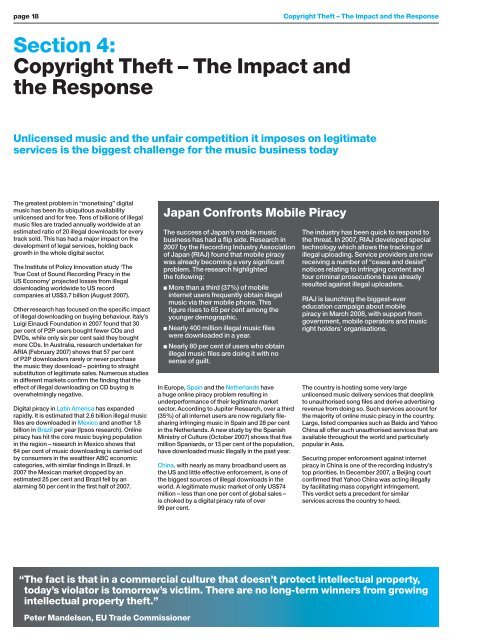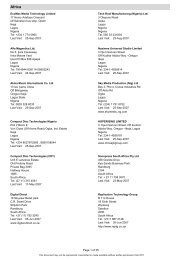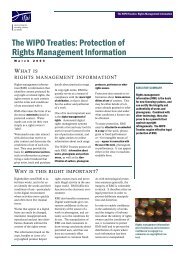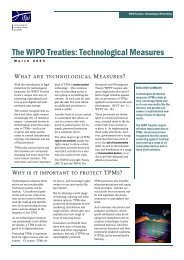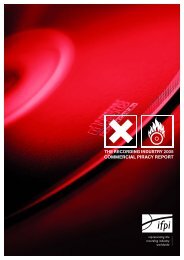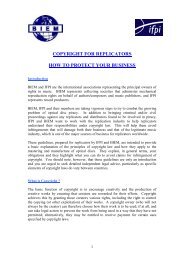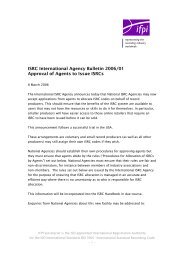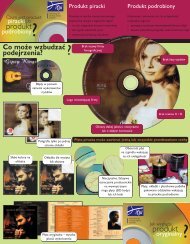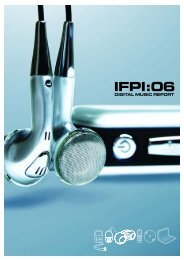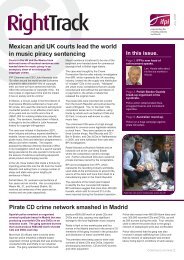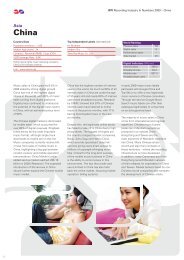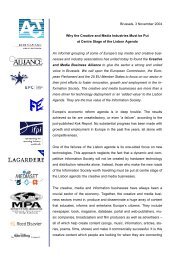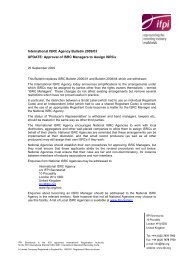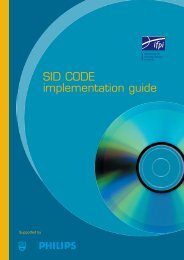Create successful ePaper yourself
Turn your PDF publications into a flip-book with our unique Google optimized e-Paper software.
page 18<br />
Section 4:<br />
Copyright Theft – The Impact and<br />
the Response<br />
The greatest problem in “monetising” digital<br />
music has been its ubiquitous availability<br />
unlicensed and for free. Tens of billions of illegal<br />
music files are traded annually worldwide at an<br />
estimated ratio of 20 illegal downloads for every<br />
track sold. This has had a major impact on the<br />
development of legal services, holding back<br />
growth in the whole digital sector.<br />
The Institute of Policy Innovation study ‘The<br />
True Cost of Sound Recording Piracy in the<br />
US Economy’ projected losses from illegal<br />
downloading worldwide to US record<br />
companies at US$3.7 billion (August 2007).<br />
Other research has focused on the specific impact<br />
of illegal downloading on buying behaviour. Italy’s<br />
Luigi Einaudi Foundation in 2007 found that 30<br />
per cent of P2P users bought fewer CDs and<br />
DVDs, while only six per cent said they bought<br />
more CDs. In Australia, research undertaken for<br />
ARIA (February 2007) shows that 57 per cent<br />
of P2P downloaders rarely or never purchase<br />
the music they download – pointing to straight<br />
substitution of legitimate sales. Numerous studies<br />
in different markets confirm the finding that the<br />
effect of illegal downloading on CD buying is<br />
overwhelmingly negative.<br />
Digital piracy in Latin America has expanded<br />
rapidly. It is estimated that 2.6 billion illegal music<br />
files are downloaded in Mexico and another 1.8<br />
billion in Brazil per year (Ipsos research). Online<br />
piracy has hit the core music buying population<br />
in the region – research in Mexico shows that<br />
64 per cent of music downloading is carried out<br />
by consumers in the wealthier ABC economic<br />
categories, with similar findings in Brazil. In<br />
2007 the Mexican market dropped by an<br />
estimated 25 per cent and Brazil fell by an<br />
alarming 50 per cent in the first half of 2007.<br />
In Europe, Spain and the Netherlands have<br />
a huge online piracy problem resulting in<br />
underperformance of their legitimate market<br />
sector. According to Jupiter Research, over a third<br />
(35%) of all internet users are now regularly filesharing<br />
infringing music in Spain and 28 per cent<br />
in the Netherlands. A new study by the Spanish<br />
Ministry of Culture (October 2007) shows that five<br />
million Spaniards, or 13 per cent of the population,<br />
have downloaded music illegally in the past year.<br />
China, with nearly as many broadband users as<br />
the US and little effective enforcement, is one of<br />
the biggest sources of illegal downloads in the<br />
world. A legitimate music market of only US$74<br />
million – less than one per cent of global sales –<br />
is choked by a digital piracy rate of over<br />
99 per cent.<br />
Copyright Theft – The Impact and the Response<br />
Unlicensed music and the unfair competition it imposes on legitimate<br />
services is the biggest challenge for the music business today<br />
Japan Confronts Mobile Piracy<br />
The success of Japan’s mobile music<br />
business has had a flip side. Research in<br />
2007 by the Recording Industry Association<br />
of Japan (RIAJ) found that mobile piracy<br />
was already becoming a very significant<br />
problem. The research highlighted<br />
the following:<br />
n More than a third (37%) of mobile<br />
internet users frequently obtain illegal<br />
music via their mobile phone. This<br />
figure rises to 65 per cent among the<br />
younger demographic.<br />
n Nearly 400 million illegal music files<br />
were downloaded in a year.<br />
n Nearly 80 per cent of users who obtain<br />
illegal music files are doing it with no<br />
sense of guilt.<br />
The industry has been quick to respond to<br />
the threat. In 2007, RIAJ developed special<br />
technology which allows the tracking of<br />
illegal uploading. Service providers are now<br />
receiving a number of “cease and desist”<br />
notices relating to infringing content and<br />
four criminal prosecutions have already<br />
resulted against illegal uploaders.<br />
RIAJ is launching the biggest-ever<br />
education campaign about mobile<br />
piracy in March <strong>2008</strong>, with support from<br />
government, mobile operators and music<br />
right holders’ organisations.<br />
The country is hosting some very large<br />
unlicensed music delivery services that deeplink<br />
to unauthorised song files and derive advertising<br />
revenue from doing so. Such services account for<br />
the majority of online music piracy in the country.<br />
Large, listed companies such as Baidu and Yahoo<br />
China all offer such unauthorised services that are<br />
available throughout the world and particularly<br />
popular in Asia.<br />
Securing proper enforcement against internet<br />
piracy in China is one of the recording industry’s<br />
top priorities. In December 2007, a Beijing court<br />
confirmed that Yahoo China was acting illegally<br />
by facilitating mass copyright infringement.<br />
This verdict sets a precedent for similar<br />
services across the country to heed.<br />
“ The fact is that in a commercial culture that doesn’t protect intellectual property,<br />
today’s violator is tomorrow’s victim. There are no long-term winners from growing<br />
intellectual property theft.”<br />
Peter Mandelson, EU Trade Commissioner


